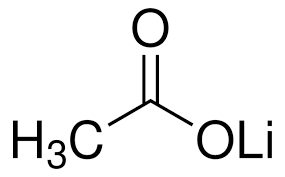Lithium Battery & Electrolyte Chemicals
HI! I’M ELEMENT AI.
Lithium Acetate

Product Description
Lithium acetate is a salt of lithium and acetic acid.
Product:
Lithium Acetate
CAS:
546-89-4
Synonym:
Lithium ethanate; acetic acid, lithium salt
Structure:

Typical Characteristics
Appearance
White powder
Density
1.26 g/cm3
Melting point
286 °C
Molecular Weight
65.98
Purity
99%
Uses, Applications & Markets
Key applications
Markets
get a quote
We Offer Lithium Acetate
in various grades
A few of the grades available are listed below:



Lithium Acetate used in many
industry applications
Lithium acetate, a lithium salt of acetic acid. finds various industrial applications owing to its unique properties. Here's a list of some of its industrial uses:
- Chemical Synthesis: Lithium acetate serves as a precursor or catalyst in organic synthesis reactions, particularly in the production of pharmaceuticals, fragrances, and fine chemicals.
- Desiccant: It is utilized as a desiccant in air conditioning and refrigeration systems to remove moisture from the air, preventing corrosion and enhancing efficiency.
- Battery Electrolytes: Lithium acetate is sometimes used in the formulation of electrolytes for lithium-ion batteries, where it helps improve battery performance and stability.
- Lithium Metal Production: It can be employed in the process of refining lithium metal from ores or brines, aiding in the purification and extraction steps.
- Heat Transfer Fluids: In some specialized applications, lithium acetate solutions are used as heat transfer fluids due to their high specific heat capacity and thermal conductivity.
- Hydraulic Fracturing: Lithium acetate is occasionally utilized in hydraulic fracturing ("fracking") operations in the oil and gas industry as a friction reducer and to stabilize clay formations.
- Textile Industry: It may be employed in the textile industry as a flame retardant or as an additive to improve the dyeing process by enhancing dye uptake.
- Concrete Additive: Lithium acetate can be used as an additive in concrete formulations to improve strength, durability, and resistance to chemical attack.
- Corrosion Inhibitor: It finds applications as a corrosion inhibitor in various metalworking processes to protect metal surfaces from degradation caused by exposure to corrosive environments.
- Biotechnology: Lithium acetate is used in molecular biology techniques, such as the transformation of yeast cells in genetic engineering experiments.
- Coolants and Antifreeze: Lithium acetate solutions can serve as coolants and antifreeze agents in some industrial processes, providing freeze protection and thermal stability.
- Photography: Lithium acetate has historically been used in certain photographic processes as a component of developer solutions.